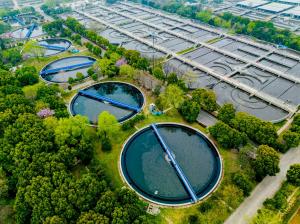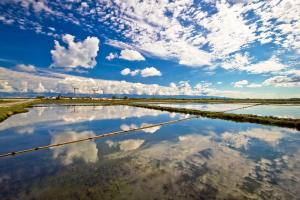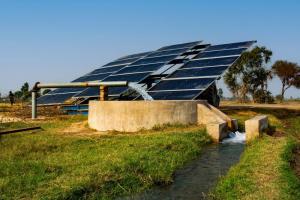World Future Energy Summit 2025 to Address Arid Regions' Water Challenges Through AI Innovation and Top-Level Talks

The Summit will display a variety of water-related innovations, including AI-driven irrigation systems
Taking place at the Abu Dhabi National Exhibition Centre (ADNEC) from January 14–16, the Summit’s dedicated Water Conference will explore pioneering technologies and strategies, bringing together thought leaders and innovators to redefine water management in some of the world’s most water-stressed regions and reduce leakage across distribution systems, which the industry says accounts for 30 per cent of water waste.
According to current UN Environment Programme data, only 11 per cent of the world’s treated wastewater is reused, with approximately 50 per cent of untreated wastewater polluting rivers, lakes, and oceans. Treated wastewater reuse is a valuable yet underutilised resource, and offers a circular economy opportunity, creates new revenue streams and jobs, fosters innovation, and advances wastewater management practices.
Beyond irrigation and industrial cooling, treated wastewater can recharge groundwater aquifers, be utilised as a concrete additive in construction, and even produce biogas through waste-to-energy technology.
The MENA region, home to 15 of the world’s 20 most water-scarce nations, faces mounting water security threats. According to The World Bank, by 2030, the amount of water available per capita in MENA will fall below the absolute water scarcity threshold of 500 cubic meters per person, per year and, as the population grows, the problem will become even more acute. Against this backdrop, the World Future Energy Summit’s Water Conference will serve as a platform to discuss sustainable solutions in desalination, wastewater reuse, water network optimisation, and smart water technologies.
The conference will analyse game-changing innovations and strategic insights to address a crisis being worsened by climate change, with the UAE’s National Climate Change Plan to 2050 looking to foster public-private partnerships in water management and desalination technologies.
The conference will also spotlight enhanced desalination innovations to reduce the environmental footprint and economic costs of desalination, advanced wastewater reuse methods, and smart water management technologies, including leveraging Artificial Intelligence (AI) and IoT for real-time monitoring, leak detection, irrigation optimisation and opportunities to transform wastewater into sustainable revenue-generating models.
Influential speakers include Dr AlaEldin Idris Elhag, Water Resources Expert at the UAE Ministry of Energy & Infrastructure and Dr Najib Dandachi, CEO of Al Usul, and Dr Mohamed Hamyd Dawoud, Advisor for Environment Quality at the Environment Agency Abu Dhabi. They will join the opening panel discussion to explore how regions can turn water vulnerabilities into strengths through community-driven initiatives, policy frameworks, and successful public-private partnerships (PPP).
Speaking ahead of the event next week, Dr Mohamed Hamyd Dawoud said; "The Water Conference spotlights the critical role of innovation in addressing water challenges in arid regions, where climate change and population growth are driving an increase in demand. As water scarcity deepens, cutting-edge technologies and artificial intelligence (AI) are emerging as game-changers in enhancing water supply and efficiency.”
According to Dawoud, AI-driven tools enable real-time monitoring, predictive modelling, and optimised water distribution, ensuring resources are allocated with precision, with innovations in desalination, wastewater reuse, and smart irrigation systems redefining water management to meet growing needs sustainably. At the same time, these advancements support resilience to climate impacts, such as prolonged droughts and erratic rainfall.
“By fostering collaboration among governments, researchers, and industries, the conference paves the way for scalable solutions tailored to arid regions, ensuring water security while safeguarding ecosystems. It underscores the urgent need for smart, sustainable approaches to meet the rising water demand and secure a better future," added Dawoud.
Alok Srivastava, General Manager at Clear Water Solutions, part of the UAE-based Al Shirawi Group, will join a panel examining the potential sustainable and revenue opportunities from water reuse. He emphasised the importance of industry collaboration, stating: “Through our efforts, our company is contributing directly to addressing water security challenges in the Middle East by introducing sustainable desalination solutions that incorporate biological treatment and membrane-based methods, which I will look at in-depth during my session next week. Being part of the World Future Energy Summit has greatly enhanced our networking opportunities and deepened our understanding of emerging trends and technologies.”
The Summit will display a variety of water-related innovations, including AI-driven irrigation systems, blockchain for water management transparency, and cutting-edge nanotechnology in water treatment, which, according to Consegic Business Intelligence, will be a market worth over US$53 billion by 2031, growing by 16.3 per cent annually. “These technologies underscore the UAE’s commitment to sustainability and align with its National Climate Change Plan, which looks to secure resilience across water, energy, and infrastructure by 2050,” added Leen AlSebai, General Manager of RX Middle East and Head of World Future Energy Summit.
The World Future Energy Summit is the leading platform for renewable energy, clean technologies, and sustainability. With a dedicated focus on solving global energy and water challenges, the Summit continues to position the UAE as a global hub for innovation.
Nour Ibrahim
MCS Action FZ LLC
+971 544250187
email us here


